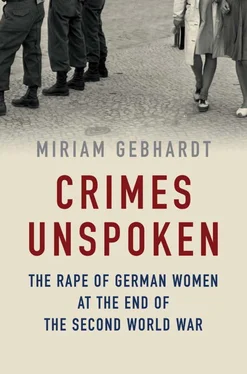Der Spiegel , 30 March 1960.
Telegraf, Berlin, 29 November 1959.
Tagesspiegel , 6 December 1959, from the newspaper cutting collection for the exhibition ‘Worüber kaum gesprochen wurde: Frauen und alliierte Soldaten’, in: Material zur Ausstellung des Heimatmuseums Charlottenburg, 3.–15.10.1995.
Ibid., eyewitness accounts in Museum Charlottenburg.
https://en.wikipedia.org/wiki/A_Woman_in_Berlin.
Frankfurter Allgemeine Zeitung , 21 June 2003, p. 44.
Bisky, ‘Wenn Jungen Weltgeschichte spielen.
Anonymous, A Woman in Berlin – Eight Weeks in the Conquered City: A Diary (London 1982).
Ibid.
Ibid.
Ibid.
Ibid.
Ibid.
Ibid.
Ibid.
Ibid.
Bisky, ‘Wenn Jungen Weltgeschichte spielen’.
Ibid.
For a detailed discussion of Bisky’s reservations, see also Constanze Jaiser, review of Anonyma – Eine Frau in Berlin, Tagesbuchaufzeichnungen vom 20. April bis 22. Juni 1945 (Frankfurt 2003), in: H-Soz-u-Kult , 5 December 2003, http://hsozkult.geschichte.hu-berlin.de/rezensionen/2003–4–128.
Susanne zur Nieden, Alltag im Ausnahmezustand: Frauentagebücher im zerstörten Deutschland 1943 bis 1945 (Berlin 1993). A number of works have been published on research into personal testimony, including by the author; see, for example, ‘Der Fall Clara Geissmar, oder von der Verführungskunst weiblicher Autobiographik’, in: Kirsten Heinsohn and Stefanie Schüler-Springorum (eds.), Deutsch-jüdische Geschichte als Geschlechtergeschichte: Studien zum 19. und 20. Jahrhundert (Göttingen 2006), pp. 233–49; more generally, Dagmar Günther, ‘And now for something completely different: prolegomena zur Autobiographie als Quelle der Geschichtswissenschaft’, in: Historische Zeitschrift , 272 (2001), pp. 25–61.
Silke Satjukow, Befreiung? Die Ostdeutschen und 1945 (Leipzig 2009), p. 7.
Jarausch, Die Umkehr , p. 150.
Ibid., pp. 15–16.
Egon Renztsch, head of the Literature and Book Department in the Ministry of Culture on 27 September 1961, quoted in Birgit Dahlke, ‘“Frau Komm!” Vergewaltigungen 1945: Zur Geschichte eines Diskurses’, in: Dahlke et al. (eds.), LiteraturGesellschaft DDR: Kanonkämpfe und ihre Geschichte(n) (Stuttgart 2000), pp. 272–311, here p. 293.
Jarausch, Die Umkehr , p. 46.
Ibid., p. 159.
Süddeutsche Zeitung , 9 January 1952, BayHStaA, breaches of the peace, newspaper cuttings, MInn 80210.
Süddeutsche Zeitung , 24 October 1952, ibid.
‘Die Amerikaner in Deutschland’, Ernst Müller-Meiningen in the Süddeutsche Zeitung , 25/26 April 1953, ibid.
Müller, US-Truppen und Sowjetarmee in Deutschland , p. 75.
BayHStaA MInn 91951, breaches of the peace by foreign armed forces.
Müller, US-Truppen und Sowjetarmee in Deutschland , pp. 78–9.
Susan Brownmiller, Against Our Will: Men, Women, and Rape (New York 1975).
Ibid., pp. 14–15.
Ibid., p. 35.
The relevance of this view was demonstrated last year in the Gaza war, when a professor at Bar Ilan University in Tel Aviv claimed in a radio interview that the only thing that would deter Palestinians from their suicide missions would be the fear that their women would be raped by Jews in revenge; see http://forward.com/news/breaking-news/202558/israeli-professor-suggests-rape-wouldserve-as-ter.
Brownmiller, Against Our Will , p. 309.
A drunken GI tried to drag her mother out of the house while she was visiting Stadtlauingen. For this ‘attempted rape’, the soldier was court-martialled and shot by the American military police. One might wonder whether an attempted abduction like this would have prompted such a reaction at the time. At all events, Schwarzer cites it as one of the reasons for her feminist position on violence: Alice Schwarzer, Lebenslauf (Cologne 2011), p. 31.
A report by a victim in a special issue of the feminist newspaper Courage from 1980 about the everyday life of women during the war is one of the few exceptions in this regard; Helga Born, ‘Das Vergewaltigen war noch im vollem Gange’, Courage, aktuelle Frauenzeitung special issue 2, 3 (1980), online edition of Friedrich-Ebert-Stiftung, pp. 57–61. The rape problem remains today one of the greatest feminist works in progress. The majority of incidents are still unreported because the victims’ moral conduct would be shown up in court in an embarrassing manner. Until the late 1990s, the criteria for rape were extremely rigid. For a rape to be recognized at all, there had to be a considerable amount of violence involved. Within a marriage and also with prostitution, it was not considered a criminal offence if prior consent to sexual intercourse had been given: ‘The restrictive interpretation of rape is particularly surprising given that rape is one of the most serious crimes in the laws governing sexual offences and signifies an extreme emotional burden for the victim. Judicial opinion on rape has not kept up with the development of social attitudes to sexuality and sexual delinquency. It remains dominated by patriarchal structures that have begun to lose their hold only in the last few years and by a traditional condemnation of prostitutes. All told, the attitude of the courts to rape may be regarded as backward.’ It was not a feminist who wrote these words about the lax interpretation of rape but a law professor at the University of Bonn: Johannes A. J. Brüggemann, Entwicklung und Wandel des Sexualstrafrechts in der Geschichte unseres StGB: Die Reform der Sexualdelikte einst und jetzt (Baden-Baden 2013), pp. 289–90.
Helke Sander’s historic speech can be read on the Internet at www.hdg.de/lemo/html/dokumente/Kontinuitaet-UndWandel_redeSandersZurNeuenFrauenbewegung.
See Miriam Gebhardt, Alice im Niemandsland: Wie die deutsche Frauenbewegung die Frauen verlor (Munich 2012).
Natascha Drubek-Meyer, ‘Griffiths und Vertovs Wiege: Dziga Vertovs Film Kolybel’naja (1937)’, in: Frauen und Film 54/55 (1994), pp. 31–51.
Naimark, ‘The Russians and Germans’, p. 206.
See Moeller, War Stories.
Gudrun Brockhaus, ‘Kontroversen um die “Kriegskindheit”’, in: Forum Psychoanalyse no. 26 (2010), pp. 313–24, here p. 315.
Читать дальше











